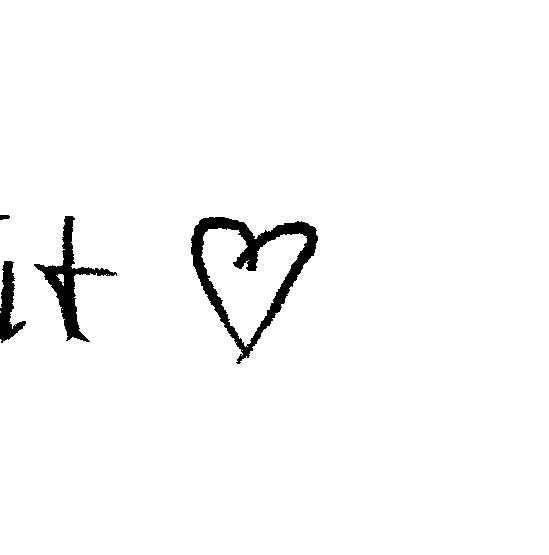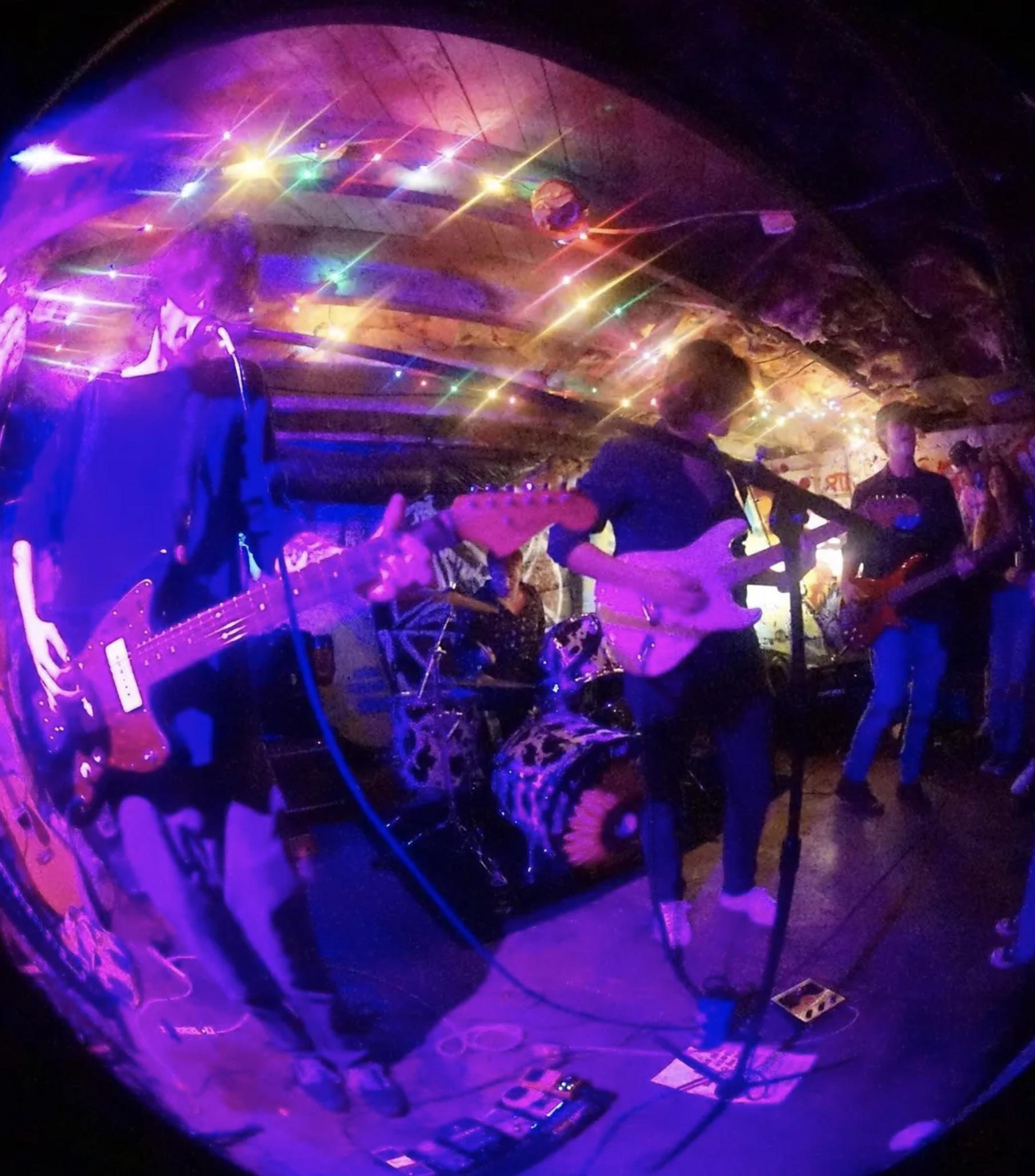
32 minute read
see STICKY NOTES
from The Breeze 3.24.22
by The Breeze
EDITORS
Amy Needham & Charlotte Matherly
Advertisement
thebreezeculture@gmail.com
@Breeze_Culture







The Sticky Note Project seeks to uplift JMU
from STICKY NOTES, page 1
“We’ve gotten a lot of messages,” Kowalsky, also a sophomore, said. “Some people just talk about how they appreciated it and have been excited to find them, and it’s been cool … We just want everyone to feel like part of the community.”
One follower sent in a photo of a note they found accompanied by the message “i saw this in the urec bathroom and it made my day” [sic] Another follower found a note in the Bioscience building that said, “You are more than just a number.” In their DMs, they said, “I’m having a really rough time right now and this helped a little bit … You guys are wonderful people for doing this. Sometimes all you need is a small heartfelt comment.”
The Sticky Note Project’s feedback so far has also extended to others taking action. Some followers have expressed a desire to help out by making and distributing their own sticky notes. Radtke mentioned one person who reached out to the team and said she was putting her own notes in the practice rooms and halls of the Forbes Center.
“It’s been really cute that people have been kind of joining in without being officially, quote unquote, ‘part of the project.’”
The initiative has also gained the attention of Tim Miller, vice president for student affairs. He said in an email that he recently discovered the project after seeing a note at Village Juice and Kitchen and said he was happy to see the three friends’ impact on the community.
“I am always proud of our students when they see an issue or concern and step up to address it,” Miller said. “It’s amazing to me how even one gesture can make a difference in someone’s life and this project exemplifies that truth. Each of us can make a difference and these students have chosen to take action when faced with tragedy and I am thankful to them for making that choice” [sic]
In addition to sharing photos of the sticky notes, Radtke creates graphics with mental health reminders and encouraging messages the team posts on Instagram. Radtke said it can sometimes be hard for the group to remember to take pictures and that eye-catching graphics are more likely to be shared across the platform.
“I just started making them and posting them, and they seem to have done kind of well,” Radtke said. “The popular positivity pages are the ones that look really pretty and aesthetic, and those are the things that get reposted — and not so much the just plain sticky notes.”
As they’ve started to see the effects of their work in the JMU community, the project’s founders said they’ve also felt personally impacted by it. Twigg said she had a challenging semester last fall, and her roommates cheered her up with sticky notes before they ever started their initiative.
“I woke up one morning, and I walked down the stairs and [they were] just covered in sticky notes from my roommates of encouraging words,” Twigg said. “It brought me to tears and I still have them all to this day, and the way that made me feel is how I want to make other people feel … It’s just such a loving and awesome feeling to know that people really do care.” While Twigg experienced how it feels to receive the sticky notes, Radtke said she feels equally emotional when leaving them for others. “It makes me smile to see other people smile,” Radtke said. “It really makes you feel like you’re doing something good. I think most people want to feel like they’ve had a positive impact while they’re here.”
Radtke and Twigg also said that after seeing the effect the project has had on JMU, they hope it will expand beyond Harrisonburg.
“It would be really cool if other college campuses decided to join in and started to start seeking out projects of their own,” Radtke said. “That would be really cool if it could become something bigger, something outside of JMU — like a larger movement that’s more than just me and my roommates.”
As the team behind the Sticky Note Project pursues these aspirations for growth, they plan to continue their dayto-day efforts of small acts of kindness at JMU. Radtke said she and the other founders would love to increase their Instagram presence and “create a community of people that feel loved.”
Radtke added that although not everyone will follow the project on Instagram, people will often find their notes around campus. Kowalsky echoed Radtke’s optimism for the project’s success.
“We just hope that more people can see them, and maybe, more people will check our page,” Kowalsky said. “Overall, it’s just meant to improve people’s day, just by a little bit. That’s about as much as we can do.”

Madison Root / The Breeze
CONTACT Michael Russo at russomw@ dukes.jmu.edu. For more on the culture, arts and lifestyle of the JMU and Harrisonburg communities, follow the culture desk on Twitter and Instagram @Breeze_Culture.

Capstone Capstone for a cure for a cure
Anderson said he wants to use his privilege to help those affected by the disparities he’s observed in his honors capstone research. Matt Young / The Breeze

JMU senior conducts research on health disparities
By MORGAN VUKNIC
The Breeze
After thinking about his honors capstone project, Simon Anderson, a senior biotechnology and independent scholars double major, decided he wanted to work in the biotechnology lab to conduct hands-on research. He took a particular interest in health disparities.
Anderson chose to research breast cancer in Black women. He said he selected this because Black women are 40% more likely to die from breast cancer than white women despite having the same chances of developing it, according to the American Cancer Society.
Anderson said hormone-dependent breast cancer can develop quickly and be influenced by genetic and environmental factors. Anderson said he wants to find a way to stop this particular cancer that’s disproportionately killing Black women.
“What I want to do is look at these factors and think, what can I do in the lab that will benefit everyone?” Anderson said. “How will [my work] benefit this particular vulnerable group?”
For his research, Anderson spends most of his time in a lab looking at data, graphs and DNA associated with the development of breast cancer. Specifically, he analyzes the proteins that influence this cancer and tries to mimic the cancer to see if he can find a way to either minimize or eliminate it completely.
‘Real-world’ research
In the independent scholars program, students create their own major that consists of 12 classes. At the start of the program, students propose a research topic that encompasses a real-world issue they’re interested in.
The independent scholars program director, Matthew Chamberlin, said Anderson isn’t interested only in the medical side of health but also the cultural and social aspects of it — hence he’s researching a topic that fuses the two aspects.
While the independent scholars program doesn’t assist Anderson directly with his research — meaning the program doesn’t help him choose a topic or help with the hands-on experiments — Chamberlin said the program connects Anderson with professors and resources that can guide his work.
“[Anderson] came to [independent scholars] interested in the way different cultures and communities conceptualize heath,” Chamberlin said. “You don’t have to travel abroad to see immense cultural variability in the way that people view their own well-being. We’ve helped him build connections with people in different disciplines.”
Chamberlin said he believes Anderson’s research is “immensely important.” He said it’s been “amazing” watching Anderson’s drive to learn how people think about health so he can improve their quality of life.
“I think [Anderson] brings an awareness to the field of health. He realizes that [healthcare] isn’t simply treating a disease; it’s also about learning about people,” Chamberlin said. “He wants to know about people in a way that will let him help them.”
Philip Frana, an independent scholars and interdisciplinary liberal studies professor, has also been involved in the project. Like Chamberlin, Frana has helped Anderson pursue his independent scholars major by connecting him with other professionals in the biosciences field.
While Frana said he isn’t overly familiar with the specifics of Anderson’s research, he said it’s very important for the biomedical field to increase diversity in order to get a more accurate look at the human population.
“I think [Anderson’s] really trying to make some recompense for some of these historic inequalities that exist in biomedical research,” Frana said. “Biomedical studies have long defined normal human test subjects as white, middleaged males, but there is so much diversity in the human population … If you look at just one sliver of it, you’re not going to gain an understanding of anything.”
Break the mold
Anderson said he wants to use the privileges he’s been given in life, such as being white, male, cisgender and financially stable, to help others by going to medical school pursuing cancer research. He said he doesn’t want his privilege to be a reason not to treat people but rather a way to help others.
“There’s no reason that I should sit there and tell patients, oh, that sucks for you,” Anderson said. “I want to take what I’m doing and alleviate others’ pain. The reason I’m doing it, and the way I’m doing it, is so that it can then be applied to people who are less privileged than I am.”
The Association of American Medical Colleges in 2018 found that 56.2% of active physicians identified as white. Because most doctors are white men, Anderson said, they continue to operate the way they’re used to. Anderson said he believes that when these types of doctors treat all of their patients the same way, marginalized groups like women, Black people and members of the LGBTQ community don’t receive the same level of medical care that their white, straight, male peers do. He said physicians need to be more open-minded about the diversity in those they treat.
“The lot you’re given in life, for the most part, is random,” Anderson said. “These massive disparities among different groups of people are created, and some people don’t have the same opportunities as everyone else because they were born with a certain skin color or in a certain place — why should that be allowed to continue?”
Along with using his privilege, Anderson said he also wants to use the fact that he’s often taken seriously as a patient to his advantage. Black women, conversely, sometimes aren’t taken seriously when it comes to their health, according to TODAY. Since this disparity exists, Anderson is trying to work on detecting and slowing breast cancer through the use of C. elegans, a type of worm, with certain proteins. When the C. elegans and proteins are combined, they can help detect breast cancer — this helps Black women since that certain cancer disproportionally affects them.
While Anderson doesn’t plan to continue his research after he graduates and instead plans to go to medical school, he said helping marginalized communities will always be important to him and that more healthcare workers need to focus on helping all types of people.
“There’s all of these racial and ethnic biases in the healthcare field that create these vicious cycles of inequities,” Anderson said. “Since the medical field is mainly white males, when you get a patient who has a problem that’s foreign [to white males], you need more open mindedness. There needs to be more connection and understanding [in the medical field] where doctors can say ‘I understand there’s a problem, and I’m going to help fix it.’”
CONTACT Morgan Vuknic at vuknicma@ dukes.jmu.edu. For more on the culture, arts and lifestyle of the JMU and Harrisonburg communities, follow the culture desk on Twitter and Instagram @Breeze_Culture.
Thursday, March 24, 2022
Rocktown Rocktown rockstars rockstars
Back Up Kid band reflects on its formation and future
Back Up Kid is composed of guitarist Tyler Dodge, bassist Ian Marburger, drummer Brandon Carroll and vocalist and guitarist Tim Devine. Photos courtesy of @backupkidva on Instagram


Tim Devine (left) was recruited when he responded to Dodge’s “Looking for band members” discussion post sent to their Survey of the Music Industry class in October 2020.
By HALEY THOMAS
contributing writer
After the band’s Sunday night practice, Back Up Kid guitarist Tyler Dodge brought out plates of blueberry bread prepared by his roommate. His band members said jokingly that it’s indicative of why he’s their guitarist: They know they’ll leave with some sort of delicious baked goods if they practice at his house.
Dodge is joined by bassist Ian Marburger, drummer Brandon Carroll and vocalist and guitarist Tim Devine — all JMU students.
Back Up Kid is known for its rock ’n’ roll sound, but the group finds inspiration from sources ranging from Kendrick Lamar to The Front Bottoms. Devine lifted his sleeve to reveal a tattoo of a flashlight — a nod to The Front Bottoms’ song, “Flashlight.”
“I love rock ’n’ roll because it’s loud — it’s cool,” Marburger said. “It’s emotional, and people sing about stuff I can relate to.”
The early days
Dodge and Carroll were the first to meet — they both lived in Weaver Hall their freshman year in 2019. Carroll said they met after hearing each other play guitar from their rooms and that they instantly knew they wanted to form a band together.
During his sophomore year, Dodge made a discussion post titled “Looking for band members” in October 2020 and sent it to his Survey of the Music Industry class. Devine reached out, already having written what would become Back Up Kid’s first album: “Goodness, Gracious.”
While Devine and Dodge have always stuck to vocals and guitar, Carroll played bass in his early days before switching to drums. Their original fourth member was drummer Dane Ludwig, whom Carroll eventually took over for.
Devine said there were several reasons why the early version of Back Up Kid didn’t work out, one being that Ludwig was in several other bands, so it was hard to find practice time. Devine also wanted to play the songs he’d written, but the group was more of a cover band at the time.
“I feel like we were all sort of doing different things,” Devine said. “The first album was still my baby, and I wanted to wait until I knew it would sound perfect.”
Something clicked when they met Marburger, who was in the same Survey of the Music Industry class as Dodge and Devine.
Marburger also made a discussion post in search of bandmates, earning him an invitation to play with Devine and Dodge at one of their shows. Soon after, Marburger became the band’s permanent bassist and Carroll switched to drums.
As Marburger put it, “The rest is history.”
Having all grown up in musical families, Dodge, Marburger, Carroll and Devine said they’ve always been passionate about music.
Dodge had a childhood dream, he said, of being in a band. He and his siblings used to pretend they each had their own bands and come up with different names.
“Mine was Skull Searchers — I made that when I was 5,” Dodge said, chuckling. “My sister’s was Eye of the Hurricane, and my brother’s was Centuries Past. Now that I think about it, I might just borrow those from my childhood because those are pretty OK names.”
Marburger has been playing bass for about one year and guitar for five. He said being in a band has also been an ambition of his since he was a child.
“My dad was in a lot of bands, and I always looked up to that,” Marburger said. “Being in my own band was an absolute dream.”
Carroll has been playing drums for almost two years — something he said partially stems from his levels of stage comfortability.
“I used to get so nervous when I played bass because I was in the front,” Carroll said. “I love the drums because I get to hide behind everyone else and just go all in.”
Devine has played guitar for eight years and wrote music since he joined his first band in high school. He also came up with Back Up Kid’s name, which he said was half inspired by one of his biggest musical inspirations, the band Rozwell Kid.
“The other half was just me trying to find a name that wasn’t cheesy, and that was sort of the first thing I landed on,” Devine said.
Music during a pandemic
While COVID-19 has impacted musicians around the world in different ways, the members of Back Up Kid said it only fueled their love for music.
“The whole first album came from the first four months of quarantine,” Devine said. “It gave me the time to just put all my energy into music.”
Marburger said he had a similar experience.
“Before [the pandemic], I had been doing music a little bit for fun, and I’d been playing guitar for a while, but I had so much time over quarantine,” Marburger said. “To me, it was the turning point that really got me into music.”
Dodge also said the time alone helped his creative process, reflecting on the moment he found out students wouldn’t return to JMU after spring break in 2020.
“All I’d brought home was my guitar and some clothes,” Dodge said. “For a while, every single day [consisted of] a bike ride with my dad and playing guitar for the rest of the day—”
“COVID bike rides!” Devine interjected. “I was riding the shit out of my bike.”
Although the pandemic gave the members of Back Up Kid more time to focus on music and new hobbies, all they really wanted, they said, was to play their music for a crowd again.
“We were itching to play live shows because we’d been practicing a lot at that point, but we also didn’t know if it was the right time,” Carroll said. “Even if [venues] were open, it was in the court of public opinion. You didn’t want to be the band that was playing live when it wasn’t safe to.”
When it was safe to play live shows, Devine said, he realized how much this music meant to him.
“What had the most impact on me was finally being able to play these songs that I’d written and had never been able to play with other people,” Devine said. “It was an incredible feeling.”

Though the pandemic gave the band members time to foster their creativity and pick up hobbies, they all said they missed playing their music for a crowd.

Hit the road
The band went on its first tour in November 2021 to promote its second album, “Turn To Gold.”
Devine was involved in the D.I.Y. music scene on Twitter, which is essentially a community of artists, labels and venues who promote one another without the intervention of large record labels. Devine said this led him to two independent labels in the early days of Back Up Kid: Knife Punch Records and Chillwave Records. The labels helped the band release the albums and tapes and helped book the four-day, three-show tour that spanned from Richmond, Virginia, to Philadelphia to New Brunswick, New Jersey.
The band packed up Carroll’s brother’s Honda CR-V and hit the road. Carroll said the living conditions were cramped — the vehicle was overflowing with instruments, snacks and the four members who were practically on top of one another.
“When you spend four days straight with the same people and no alone time at all, you definitely get closer to each other,” Carroll said as they all laughed. “I’m used to waking up early to have time alone, but there’s no such thing as alone time with these guys all jammed into a CR-V.”
Before a live show, the band usually practices for about 30 minutes to warm up and grabs something to eat. Devine, however, said he gets “way too nervous to eat.”
At that point, Carroll said, he starts to get stressed about the time crunch. Devine called him the “band dad.”
“I’m always like, we need to go, we need to go, we need to go,” Carroll said. “Then, we get there and no one else is even there yet. Sometimes [the venue’s] doors are even locked.”
Carroll said one of his favorite shows with Back Up Kid was a house show in Harrisonburg in summer 2021. They played a song called “Ode to the Kitchen, and My Bedroom,” a “fast and punky” anthem.
“This was the peak moment in the show during a huge breakdown, and there was just a guy in the front row slamming his hand on the concrete floor with the beat,” Carroll said.
Dodge said that later in the show, that same individual propelled himself on the ground,
head-butting Dodge in the process. Devine then imitated the dance moves of a “super drunk guy in a drug rug” at that same show who somehow made his way on stage to stand between him and Marburger during one of their groovier songs. “He kept bumping into my bass,” Marburger said, laughing. Beyond Back Up Kid Outside of Back Up Kid, the guys live what Carroll called pretty normal lives. Devine works at Blue Sprocket Pressing, a vinyl pressing plant on South Main Street; Dodge is enrolled in 19 credits and spends his free time recording in “I love rock ’n’ roll because his at-home music studio; Carroll it’s loud — it’s cool. It’s is working on a capstone project for emotional, and people sing a NASA competition that involves about stuff I can relate to.” building a rocket, which his group will be launching Ian Marburger from Alabama; and Marburger Bassist, Back Up Kid works at Jalapeno Southwest Grill and is “obsessed with UREC yoga classes.” Devine, Dodge and Marburger are all moving in together in Richmond next year — they hope to start a new band with what Devine called a “softer sound.” Carroll will be moving to Huntsville, Alabama, to start his first job as an engineer. As for Back Up Kid, the band will likely fade with the rest of their college lives. “I think [Back Up Kid] is gonna sort of dissolve after we all move away,” Devine said. “I still wanna keep the name in my back pocket in case I ever wanna release solo stuff because [the name] is how it all started for me.” Back Up Kid will be performing in Richmond on April 8, a show Carroll said he’s “beyond stoked for.” “My whole life right now is music,” Devine said. “I’m super appreciative of the D.I.Y. scene and community of musicians here in Harrisonburg. We wouldn’t be where we are now if it weren’t for them.” CONTACT Haley Thomas at thoma3hn@ dukes.jmu.edu. For more on the culture, arts and lifestyle of the JMU and Harrisonburg communities, follow the culture desk on Twitter and Instagram @Breeze_Culture.
While Back Up Kid will likely end with their college careers, Devine, Dodge and Marburger are moving to Richmond, Virginia, next year, where they hope to start a new band.

‘Pay it forward’ JMU student has unforgettable experience with famous rapper Drake

Drake gave JMU student Harrison Woodley $10,000 in cash for his birthday in the Turks and Caicos Islands.
Courtesy of Harrison Woodley
By KYLEE TOLAND
The Breeze
“I like when money makes a difference but don’t make you different.”
The lyric from famous rapper Drake’s hit song “From Time” has now been experienced by one JMU student.
Sophomore media arts and design major Harrison Woodley was on spring break with his family and girlfriend in the Turks and Caicos Islands when he met Drake. Woodley said it was his birthday, and his family decided to go to a local restaurant that “not many people were at” until they overheard from a fellow diner that someone named Drake was there.
“I was like really, like, really?’” Woodley said. “I was like, OK, I’ll go entertain myself and go check it out.”
Sure enough, Woodley said, he was met by three bodyguards when he first saw Drake and tried to take pictures of him before the bodyguards told him there were no phones or cameras allowed near the artist.
“We were like, all right, we’ll just leave him alone,’” Woodley said. “If I was in his position, I wouldn’t want to be swarmed by people if I’m just doing my own thing.”
After a while, Woodley said he and his family went near where Drake was sitting a second time — that’s when his dad spoke up about Woodley’s birthday and tried to convince the bodyguards for one photo with the rapper. As they were about to give up and leave him alone, Woodley said, one of Drake’s associates came up to the family and asked if they wanted to play a quick game. Woodley said he jumped at the opportunity.
That’s when Woodley said he met the artist and shook his hand. Woodley’s girlfriend revealed that it was his birthday, and Woodley said Drake wished him a happy birthday and asked him to sit down and play the game. It involved Woodley picking a number in an online game Drake was playing, and even though Woodley said he doesn’t think he picked the “correct” number, Drake pulled out a “designer” fanny pack and handed him $10,000 in cash.
“It was just kind of crazy for me to actually hold [the money],” Woodley said. “He seemed super down-to-earth.”
Charitable efforts
After coming home from the trip, Woodley said he was “completely up in the air” about what he wanted to do with the $10,000. His dad encouraged him to either think of things Woodley would want to purchase with the money or to donate it to different charities. Woodley said he didn’t want to spend the money on himself but didn’t know what to donate it to. Then, Woodley thought about the recent tragedies that had happened on and near JMU’s campus: the Jan. 31 and Feb. 7 suicides at JMU and the shootings at Bridgewater College and Virginia Tech. He decided to donate some of the money to the American Foundation for Suicide Prevention (AFSP).
“I feel like this is the perfect way that I can give some money to this organization,” Woodley said.
Through his fraternity Pi Beta Chi — unrecognized by JMU — Woodley teamed up with the Center Club, Inc. in Blacksburg, Virginia, to organize a philanthropy to raise money for the AFSP. Woodley said the Center Club has done an annual philanthropy event dealing with suicide prevention after a member of the organization took their own life in 2017. The philanthropy event will go live March 28 through Pi Beta Chi and the Center Club, Inc. with a goal of raising $10,000 by April 1. Both the fraternity and Center Club will be posting updates, a virtual walk, Venmo boards and other promotional events for the organization throughout the week. So far, Woodley said, he’s donated $1,000 of Drake’s money to the event and wants others to donate to the cause.
“I wanted to get the ball rolling and donate a great portion [of the money],” Woodley said. “I might end up donating some more.”
As for the rest of the money, Woodley said he’s considering investing or donating it to another charity.
Woodley said he’s received some pushback on social media, as he’s seen posts claiming he doesn’t deserve the money since he was on a “nice” vacation in Turks and Caicos. However, Woodley said he’s had people reach out to him and commend him for his actions.
One thing he said he knows he won’t do with the money is “blow it all in one go.”
“As someone that’s never had anything even close to this happen to them, I knew I should definitely pay it forward,” Woodley said. “It just feels great knowing that I’m doing something.”
CONTACT Kylee Toland at tolandkm@ dukes.jmu.edu. For more on the culture, arts and lifestyle of the JMU and Harrisonburg communities, follow the culture desk on Twitter and Instagram @Breeze_Culture.
DESIGN. PRINT. MAIL. HERE.
46 Laurel Hill Road Verona, VA 24482 540.248.5300 office sales@midvalleypress.com
midvalleypress.com

Cats, cows Cats, cows and COVID-19 and COVID-19

Rockingham County accounts for one-third of Virginia’s dairy production but has recently seen an increase in farm
closures. Cambria Lee / The Breeze
Valley experiences effects on dairy industry and pet adoption amid the pandemic
By LUKE FREISNER
contributing writer
Benjamin Blankenship goes into work just like any other day. He meets with his patients, does checkups and even performs surgery when necessary. Blankenship has a regular everyday job, only his patients are cows.
Supply chain troubles
Blankenship, a veterinarian specializing in livestock for Ashby Herd Health, spends his days with cattle doing routine herd checks. They’re typically conducted once a month; however, being a cattle specialist in an area with a rich dairy cow population — 198 farms in Rockingham County alone, according to the Daily News Record — makes for lots of herd checks. “A lot of our job is preventive medicine, more than just treating sick animals,” Blankenship said.
His ultimate goal, Blankenship said, is to help animals before they get sick rather than trying to pick up the pieces after something bad happens.
Blankenship said that unlike many other jobs, a day in the life of a livestock veterinarian hasn’t changed much since the pandemic. Regardless of lockdown, the world keeps turning — cows still get sick, and you can’t perform cow surgery over a Zoom call, he said. For Blankenship, the biggest hardship of COVID-19 has been the lack of necessary supplies needed to care for and perform surgery on cattle.
Blankenship and his team have been forced to ration their supplies, such as over the counter and prescription medications — something easier said than done. Scheduled appointments are on the docket from the morning to the afternoon, but his evenings have time allotted in case an emergency surgery is needed. In a field where demand can change on a dime, Ashby Herd Health is tasked with estimating the amount of medical supplies available.
Another difficulty faced by Blankenship and his practice, he said, have been facing is the fiscal inflation of agricultural products. Blankenship said that with farms having to pay more while earning less, many have had to close down — a hit to the area that accounts for roughly one-third of Virginia’s dairy production, according to the Daily News-Record.
“A lot of agricultural markets are not strong right now,” Blankenship said. “We depend on a market to sell, whether it’s milk or beef … or any of the agricultural products we produce in the county.”
Pet problems
Although the pandemic hasn’t drastically changed operations at Ashby Herd Health, it’s had the opposite effect on the Harrisonburg Animal Hospital.
Dave Ward, the hospital’s office manager, said major hiccups have accompanied the pandemic. The hospital pivoted to curbside operation around March 2020. Ever since, Ward said the hospital has been shifting between curbside and in-building appointments, attempting to get back to as normal as possible.
However, “normal” has yet to be reached. Bailey McInturff, a graduate student at JMU, said she was uneasy at the beginning of the pandemic and felt uncertainty leaving her dog inside to be treated while she stayed in the parking lot.
“[You’d] send your dog in with a vet technician and just hope they would behave themselves and hope that they would be OK,” McInturff said.
Much like Ashby Herd Health, Harrisonburg Animal Hospital has struggled with a shortage of necessary supplies like animal medications. Ward said companies had to prioritize the production of human medications over those for animals, and animal medications are just starting to fulfill public demand.
The shortage mostly affected medications, but the hospital lacked regular office supplies as well.
“A lot of people were stocking up [on gloves] as much as they could,” Ward said, shaking his head. “Man, we really struggled to get gloves for a while — just regular gloves.”
There’s also been a severe lack of veterinarians and veterinary technicians up for hire, Ward said, which has made it even harder to keep up with the needs of sick or injured pets. McInturff said she experienced this issue when trying to make appointments with the vet.
“The phone lines were always busy,” McInturff said. “To call and even get an appointment was difficult as well.”
Despite Harrisonburg’s infamous “dog food” smell, there’s a shortage of dog food, too.
One thing the pandemic didn’t put in short supply was new pet owners. Roughly one out of every five U.S. households adopted a new pet in the past two years, according to the American Society for the Prevention of Cruelty to Animals.
“I know it’s been difficult for many in the industry, including us … to meet that demand,” Ward said.
At the height of the pandemic, Harrisonburg Animal Hospital and the larger veterinarian community have tried their best to take on the influx of pets adopted during the quarantine. This, combined with an ongoing shortage of vets and vet technicians nationwide, led to an overwhelming disparity between doctors and incoming patients, Ward said.
However, in 2022, the situation couldn’t be more different. Ward said many of the pets adopted during peak pandemic are being given back or surrendered, as owners realize they may not have the time or money to take care of a new animal with schools and jobs reopening.
“There was a time when the shelters were empty,” Ward said. “The shelters are full again.”
Precious, a 2 1/2-year-old domestic shorthair cat, has taken residence at Harrisonburg Animal Hospital since February of this year, as there’s no space for her at local shelters. She’s been described as “a loving little lady” by the HAH Facebook page and is very fond of belly rubs. They hope to find a forever home for her soon, but it hasn’t been easy. In addition to the decrease in adoption rates, Precious was diagnosed with feline immunodeficiency virus (FIV), meaning she‘d need to be kept indoors and away from other cats for risk of exposure.
Ward cautions JMU students to think twice before they impulsively adopt pets to make sure they’re fully equipped to handle the responsibility.
“I understand people wanting to adopt pets … You’re talking to a guy running a veterinary clinic,” Ward said. “Of course [we] want more pet owners walking into the building, but we also want responsible pet owners coming into the building.”

A WEALTH OF HEALTH A WEALTH OF HEALTH
Columnist Grant Johnson passes the torch
By GRANT JOHNSON
The Breeze
There’s no way in May 2021 that you could’ve told me I’d write 24 health and wellness columns totaling 37,619 words and 4,268 unique page views.
But, here we are. And as quickly as I started, it’s over.
“A Wealth of Health” is now being passed on to another writer: Hannah Lifrieri.
Before Hannah writes her first article, I want to reflect on how much all my interviews and readers have meant to me and how this column has impacted my own health and wellness journey.
When I got to JMU, I wanted to share the “wealth.” Once I got more involved in The Breeze, I noticed a void in its health and wellness coverage which, to me, was an opportunity to use my experiences for the betterment of others in the JMU community. I pitched a health and wellness section to The Breeze’s editor-in-chief Jake Conleyroughly one year after my wellness journey’s inception the previous April.
On May 31, 2021, the first edition of “A Wealth of Health” was published.
The goal of this column was simple: to cultivate a one-stop-shop for JMU students of fact-based, thoroughly researched health and wellness content. This was accomplished by sourcing professors in the know, then disseminating the information into digestible tidbits to make tangible practice a reality for the average student.
I conducted 46 interviews with 23 different JMU professors — spanning dietetics, psychology, health sciences and kinesiology, among other majors. Some interviewees were registered dieticians, certified athletic and personal trainers, mindfulness experts, recent JMU graduates and licensed professional counselors.
I hope you, the reader, have benefited from this column. There were times when my other Breeze and school obligations caught up to me and I still had to write a column, but thinking of my readers kept me going. I didn’t want to let anyone down.
I also want to thank The Breeze’s culture editors, Amy Needham and Charlotte Matherly. You two gave me the freedom to put my own stamp on this column.
Last but not least, to Hannah: I’m really excited to see where you take this column. You’ve shown a tremendous passion for health and wellness, and now, it’s all yours. Go make it your own.
Thank you, stay wealthy and healthy.

